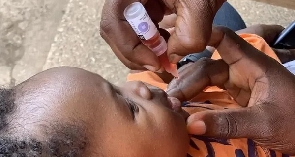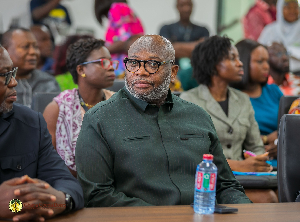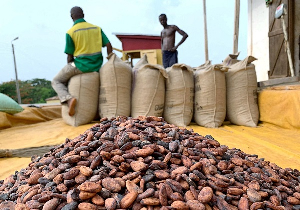The conversation around vaccines has been topical in recent weeks. This time it is not COVID-19 related. It would be recalled that the Ghana Health Service announced a shortage of the routine childhood—Polio vaccine, Bacille Calmette-Guerin (BCG) and the Measles-Rubella immunization vaccines, which are used for routine immunization of babies from birth to at least 18 months.
The announcement has generated a lot of uneasiness among Ghanaians, particularly nursing mothers, because childhood vaccines protect children from a variety of serious or potentially fatal diseases, including diphtheria, measles, mumps, rubella, polio, tetanus, and whooping cough, among others.
There is a compelling reason why these vaccines are administered quite early. Timely vaccination of children, according to UNICEF, is a proven method for saving lives from vaccine-preventable diseases. The diseases that childhood vaccines are meant to prevent are most likely to occur when a child is very young, and the risk of complications is greatest.
That makes early vaccination—sometimes beginning shortly after birth—essential. Most of the child’s vaccinations are completed between birth and six years. Many are given more than once, at different ages, and in combinations. Thus, if you postpone vaccines until a child is older, it might be too late.
Vaccinations not only protect children from these deadly diseases, but they also keep other children safe by eliminating or greatly decreasing dangerous diseases that spread from child to child. Vaccines are some of the safest and most effective medicines we have, and they have made many dangerous childhood diseases rare today.
In other words, if these diseases seem uncommon or even unheard of—it is usually because the vaccines are doing their job. As an added advantage, vaccinations can also help attain some targets like Goal 3 of the UN Sustainable Development Goals, which aims to ensure healthy lives and promote well-being for all.
Considering the critical role vaccines play in the lives of infants, the current shortage portends something sinister. Infant mortality. Danger, therefore, looms over our various health centres across the country. But Ghana has made giant strides in the area of mass vaccination of children, which has placed her on the global stage as one of the top achievers in vaccine deployment and coverage, and thus a shortage of these infant vaccines will erode the gains made over the past decades.
The situation has the potential to increase the vulnerability of children to the diseases that the vaccines seek to protect them against. Polio, for example, is an acute viral infectious disease of the nervous system that sometimes leads to a more serious and permanent paralysis of muscles in one or more limbs, the throat, or the chest. More than half of all cases of polio occur in children under the age of five.
According to the Ministry of Health, the shortage is a result of the depreciation of the Ghana Cedi. The Minister of Health, in a press briefing, said, “we were supposed to procure the vaccines in the first quarter of the year, but due to the currency depreciation, the amount that was available could not pay”. My understanding is that the MOH was lurking around patiently for the Cedi to appreciate so that less Cedi, in their imagination, would be used to procure the much-needed vaccines. Logically, not until the Cedi appreciates the vaccines would not be bought.
While innocent infants die of these childhood killer diseases? Heck! Currently, 16 districts in the northern region have recorded cases of measles since October 2022 due to the shortage of vaccines, and the number keeps rising with each passing day. Because we are connected in the circle of life, I would not be surprised if the disease spreads down south.
Someone ought to take responsibility for this. The minister in whose hands the health of the nation has been placed ought to take responsibility. Once, a leader of my church wrote a resignation letter to the church’s council. His reason was striking and never-before-heard. He had sought to resign simply because his young daughter had become pregnant.
According to him, he was responsible for protecting his daughter from unscrupulous individuals, and if his daughter’s pregnancy gave him away as an irresponsible father, he had no moral grounds to continue to hold office as a leader. To the man, the mirror that could reflect a responsible, caring and protective dad was shattered by his girl’s pregnancy. I believe he did it as an ethical and moral imperative. It is time for our health minister, Kwaku Agyeman-Manu, to say I have failed my country by not protecting the very little ones who must be given a chance to live.
The shortage, as we are aware, started during the last quarter of last year, and the indifference of the Ministry superintended it through to this time. Ghanaians’ expectations of him to resign are not too much to ask for. It is the standard practice of the governance system in countries where human lives are treasured.
What is troubling is the inconsistent timelines that the service and the MOH give regarding when the vaccines would eventually arrive in the country. This not only heightens the anxiety levels of mothers but also takes an enormous psychological toll on them.
Indeed, in other jurisdictions where resignation remains one of the basic moral resources for individuals of integrity, it is not foisted on people; they live it. It is a virtue that is prized highly in other so-called sunnier climes. In Greece, for instance, the minister of transport on Mar 1, 2023, resigned after a passenger train and a freight train crashed head-on in central Greece overnight, killing at least 36 people and injuring scores.
Kostas Karamanlis resigned, saying he felt it was his “duty” to step down “as a basic indication of respect for the memory of the people who died so unfairly”. The President must ensure that appointees of his government uphold their promises to the citizenry and that once they fall short of their commitment, they must resign.
The only time public officials in Ghana usually resign is when they desert public offices to pursue their own parochial interests. The latest mention could be of Mr. Alan Kojo Kyerematen, Minister of Trade and Industry and Dr. Akoto Afriyie, Agric Minister, who recently resigned because they needed to ready themselves for a higher calling. The call for Agyeman-Manu to resign, in fact, is not of recent vintage; it started when he breached procurement laws to procure some 300,000 overpriced Russian Sputnik V vaccines from middlemen in the UAE.
According to Mr. Agyeman-Manu, he ignored the procurement process because of the emergency situation of the COVID-19 pandemic though he knew full well it was wrong for him to bypass parliamentary approval, cabinet approval, Public Procurement Authority approval or ratification, advice from the Attorney-General, all of which are required by law.
When Parliament invited him for questioning for flouting procurement laws, he sounded markedly incoherent. A feigned incoherence devised to swindle Parliament, which consequently bought his freedom, at least for the time being.
A recent Auditors-General report revealed some infractions in the government’s expenditure for COVID-19 expenditure from March 2020 to June 2022. Some of the corrupt practices that were uncovered included:
Paying a total of US$607,419.02 out of US$4,049,419.12 for the purchase of 25 ambulances that were never delivered.
Paying unapproved GH ₵151,000 by the Information Ministry to its staff as COVID-19 insurance.
Paying for $80 million worth of vaccines by the government that was never delivered, amongst others.
Pause and consider.
If these acts of criminality were perpetrated under the kindly patronage and guidance of Mr. Agyeman-Manu, what the heck should he be walking a free man? Truth be told, Agyeman Manu still holding public office in spite of the multiple failures and scandals shows that state officials in Ghana have not been introduced to the act of resigning as a moral act.
Patrick Dobel, a professor of the Evans School, in his essay “The Ethics of Resigning,” lists three categories of reasons for resigning: personal conviction, official responsibilities, and effectiveness. According to Dobel, a public official should resign in the case when he/she notices that the enthusiasm for exercising that public function has decreased.
Official responsibility covers all those reasons for resigning that are related to the fulfilment of promises or obligations of the office.
A public official needs to resign even in cases when his/her personal abilities are not sufficient for the fulfilment of the obligation of the office he/she holds. According to Dobel, one should resign when one is not effective due to the impossibility of garnering political and public support, even if one is professionally apt and has ethical integrity.
Individuals in office promise to live up to the obligation of the office. This promise presumes that individuals have the capacity to make and keep promises, the competence to do the tasks of office, and the ability to be effective. Failure in each of these generates strong moral reasons to resign.
We planned the just-ended Independence Day celebration and budgeted for it well ahead of the year 2023, I believe, yet we could not prioritize the health and safety of infants by readying childhood vaccines to protect them. We were deeply enamoured with the fanfare and the busing of party faithful to throng all the venues of the celebration at the expense of the taxpayer.
Serpentine convoy, with its splendour and opulence, meandered its way through major thoroughfares and towns. In this sore situation, it is fair to say that money used to celebrate Independence Day could have been used to procure the vaccines. It is just a matter of priority.
It is more like building a cathedral for God when God’s children are needlessly dying of preventable diseases. A priceless irony. We have no money to cater to the health needs of Ghanaians, but we have money to erect stonewalls for a just God who dwells in the heart of man and not in sanctuaries made with human hands. In effect, cathedral builders ought to understand that Heaven is God’s throne, and the earth is His footstool.
What manner of house will Ghana build for Him, and where will His repose be? Endless musings. In fact, on God’s to-do list, He prioritizes human lives over stonewalls. Mathew 18: 14, says “even so, it is not the will of your Father which is in heaven, that one of these little ones should perish”.
Vaccines are not-over-the-counter medicines, and so even if you have the financial wherewithal, you cannot buy them. Governments largely handle vaccines. This limited access to vaccines has advantages in record-keeping, storage, injection quality, and response to anaphylactic reactions.
For now, though, the only protection from vaccine-preventable diseases is the immunity of the people around. If immunization rates drop, vaccine-preventable diseases might once again become common threats. Let us take our destinies into our own hands by doing our bit to protect our infants because the President who swore an oath to dedicate himself to the service and well-being of the people of the Republic of Ghana and to do right to all manner of persons could not keep his word. Limit people’s access to your baby.
Mother’s hygiene should be top-notch at this time. As much as possible, stay indoors with your baby and wait endlessly for the arrival of the saviour vaccines. Finally, present your baby for vaccination when we eventually get the vaccines that have made many dangerous childhood diseases rare today.
Opinions of Monday, 13 March 2023
Columnist: Nicholas Erskine















